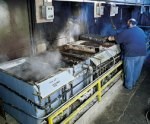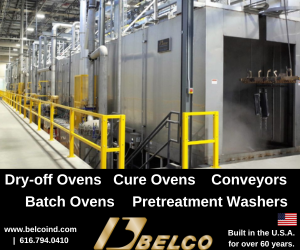Aiming for the Perfect Finish
Mossberg found the best fit and finish for its shotguns in a black oxide finish...
Snowboarding, golf, mountain biking and shooting are some of America's recreational growth leaders according to a recent survey by the National Sporting Goods Association. Today, 27 million Americans enjoy sport shooting, a leisure activity that continues to add new and different opportunities for enthusiasts of all ages.
Among the newest and fastest growing versions of this traditional, intergenerational pastime is Cowboy Action Clubs. Here, men, women and often teenagers target shoot individually or in posses on the ground or on horseback in the traditional garb of the 19th century. Always, the firearms are collector's items originals or exquisite reproductions of firearms from that era or earlier. Often, the proceeds from these popular events support children's charities such as the Roy Rogers' Happy Trails Foundation.
"Enthusiasts, whether they are deer hunting or shooting sporting clays, trap or skeet, often invest as much fitting out a gun as they do on the purchase price," according to Jack Adkins, director of operations for the Shooting Sports Council, Atlanta, GA. "It is much like a race car. The idea is performance and competition. In this case, shooting quicker and straighter, but the other half of the sport is looking great while doing it."
Gun owners have always cared a great deal about fit and finish, according to Mr. Adkins. Especially when firearms are "blued," as this industry calls it. Product design attracts first, then the finish, specifically, the wood in the stock and the patina of the metal. Nineteenth century firearms were color casehardened to give the metal a multi-toned bluish tint. Today, the best firearms finishing is an old process that has been refined to next century standards of both wear performance and aesthetics.
One of America's leading designer/manufacturers of upscale sporting rifles and shotguns, O.F. Mossberg & Sons, Inc, North Haven, CT, is known for its responsiveness to the evolving needs of America's shooters and collectors as well as to the many newcomers to the sport of shooting.
Among its more recent advancements is the Mossberg Shooting System. This allows the shooting of sporting clays, duck or black powder with a simple change of barrels and chokes. The interchangeability of these gun components is one more reason Mossberg makes certain that each metal part achieves a "jewelry-grade" finish–flawless in color and surface texture and absolutely uniform in terms of dimensional tolerance.
To achieve these standards consistently, Mossberg applies two surface chemistry protocols. Each was designed for Mossberg & Sons by Heatbath Corp., Springfield, MA.
The majority of Mossberg's metal components are processed in a gas-fired, hot blackening line, the heart of which is Pentrate Ultra, an advanced black oxide system that provides excellent aesthetics and antiglare characteristics as well as highly repeatable processing.
Incoming parts are soaked for 1-5 minutes in Uni Kleen® 14-B heavy-duty alkaline cleaner that removes solid contaminants, oils and greases, and buffing and stamping compounds. The synthetic detergents incorporated in this cleaner chemistry are not affected by acidic solutions, so the acid tank remains free of deposits that could otherwise accumulate.
Following hot and cold rinses, parts enter the 290F blackening bath. Immersion for several minutes imparts a deep black "bluing" while raising resistance to both corrosion and abrasion substantially. A proprietary inhibitor controls the buildup of colloidal iron in the bath. This eliminates the potential for superficial red, brown or green films and assures uniform blackening.
The blackening bath also incorporates a chemical rectifier that reacts with nonferrous materials, including copper, zinc and lead, preventing the discoloration these metals can cause. The rectifier assists in coloring brazed or soldered joints, assuring thorough blending with the black oxide finish.
The blackening system penetrates the surface of steel parts without altering their dimensions. The physical properties of the steel are also unaffected. Mossberg's bluing operation is a single bath, which is standard unless product is highly alloyed steel with a high nickel or chrome constituent. In these instances, a double bath operation is recommended.
To blacken silver solder, an entirely different task metallurgically, parts are next immersed in Pentrate EE-2. The dwell time in this 160F bath is 1-15 min and then parts are hot water rinsed.
Trapped or absorbed salts are a concern wherever powdered metal components are processed. To prevent "blooming" from entrapped caustics, Mossberg follows the blackening with a 10-30 min immersion in No Bleed II. This displaces alkaline residues from assemblies and components with blind holes and crevices.
Depending on load characteristics, this bath is operated at 245F. Its high flash point (420F) gives the product exceptional stability over time and benefits the user with a long, low-maintenance bath life.
The final step in the bluing process is immersion for 1-5 min in Pen Dip® Super, a solvent-type rust-inhibiting oil with high water-dispersing qualities. This multipurpose thin-film rust preventive was engineered specifically for use after black oxiding and phosphate coating and provides long-term protection against corrosion.
Duck and goose hunters and the U.S. military favor a Mossberg shotgun that is treated differently. The process they prefer has as its core the Phos Dip M-22 manganese-iron phosphate, which is the industry's most effective pretreatment for camouflage pattern coating. It also meets the requirements of DOD-P-16232 and MIL-P-50002 for Type M coatings.
The manganese line is steam heated and has five chemical stages. The cleaning stage mirrors the black oxide line: 1-5 min in the alkaline cleaner; rinse; and immersion in phosphate conditioner MGR, a ferrous surface activator that influences the deposition of small crystals and the formation of a controlled microfinish. The result is the formation of a uniform, fine-grained manganese phosphate coating.
According to Ken Baisley, who runs both lines and Mossberg's heat treating process, the use of the conditioner prevents any adverse effects from the necessary alkaline precleaning. Mr. Baisley operates the tank between ambient and 160F, depending on load conditions. The process recipe calls for 5-30 seconds of spray, followed by 10-60 seconds of immersion. Carryover of the conditioner into the Phos Dip tank is not detrimental to the bath or parts.
The chemical step that follows is immersion in the phosphate for 10-15 min at 200-210F. This process produces a nonmetallic manganese iron phosphate coating on steel and iron and reduces both wear and galling of moving parts. Its use allows lubricating oils to readily absorb for fastest break-in of moving parts without scuffing, seizing or welding of the metal. The coating also contributes excellent corrosion resistance in concert with the application of a seal and final oil.
Following this process, parts are hot water rinsed in a mild (1/2 pint per 100 gal) solution of Phoseal® 1482. This stage is operated for 15-16 seconds between ambient and 160F. This boosts the corrosion performance and bonding properties of the phosphate coating and is the final step before applying the rust-inhibiting oil.
Recently, Mossberg was awarded ISO 9001 certification, becoming the first manufacturer of shotguns to achieve this designation. As America's only privately held manufacturer in the field, the company is proud of its achievement. The company has an extensive on-site quality lab, where all guns are individually proof tested, with loads exceeding normal pressure by 50% to ensure highest integrity of the final product.
Of course, when there is a military contract (Mossberg has supplied all branches of the U.S. armed forces since 1979, as well as many U.S. allies), things are even more intense. According to vice president Georgia Nichols, "Those standards also require us to fully disassemble ten firearms, scramble the components and reassemble them. Additionally, three shotguns are selected, and each must shoot 3,000 rounds of 00 buckshot. The standard allows 1/10 of 1% malfunction rate," she added. "And that 1/10 of 1% failure cannot be safety related."
Whether the buyer is gearing up for turkey season, buying for the local government (Mossberg is also the only shotgun manufacturer that meets the MIL specifications required for riot shotguns) or just out plinking, O.F. Mossberg & Sons wants to be his or her first choice.
Read Next
Delivering Increased Benefits to Greenhouse Films
Baystar's Borstar technology is helping customers deliver better, more reliable production methods to greenhouse agriculture.
Read MoreEducation Bringing Cleaning to Machining
Debuting new speakers and cleaning technology content during this half-day workshop co-located with IMTS 2024.
Read MoreEpisode 45: An Interview with Chandler Mancuso, MacDermid Envio Solutions
Chandler Mancuso, technical director with MacDermid Envio discusses updating your wastewater treatment system and implementing materials recycling solutions to increase efficiencies, control costs and reduce environmental impact.
Read More






















.jpg;maxWidth=300;quality=90)





